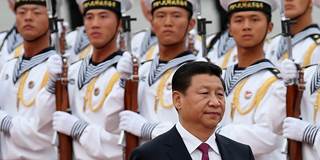The South China Sea is central to the contest for strategic influence in the larger Indo-Pacific region. Unless the US adopts a stronger policy to contain Chinese expansionism there, the widely shared vision of a free, open, and democratic-led Indo-Pacific will give way to an illiberal, repressive regional order.
SINGAPORE – US Defense Secretary Jim Mattis has spoken out against China’s strategy of “intimidation and coercion” in the South China Sea, including the deployment of anti-ship missiles, surface-to-air missiles, and electronic jammers, and, more recently, the landing of nuclear-capable bomber aircraft at Woody Island. There are, Mattis warned, “consequences to China ignoring the international community.”

SINGAPORE – US Defense Secretary Jim Mattis has spoken out against China’s strategy of “intimidation and coercion” in the South China Sea, including the deployment of anti-ship missiles, surface-to-air missiles, and electronic jammers, and, more recently, the landing of nuclear-capable bomber aircraft at Woody Island. There are, Mattis warned, “consequences to China ignoring the international community.”